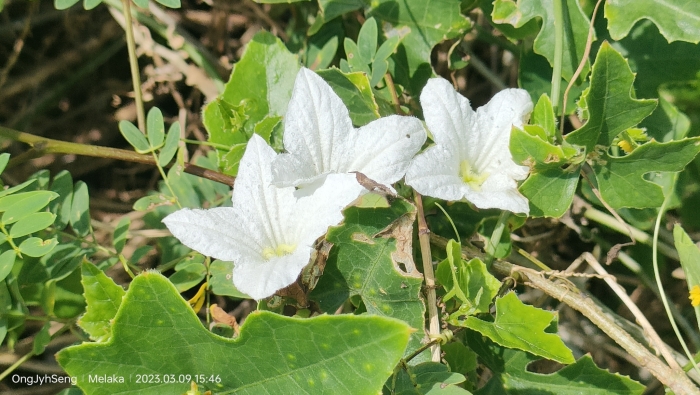Ivy Gourd
(Coccinia grandis)
Ivy Gourd (Coccinia grandis)
/
/

© Ong Jyh Seng
CC BY-SA 4.0
Image By:
© Ong Jyh Seng
Recorded By:
Copyright:
CC BY-SA 4.0
Copyright Notice:
Photo by: © Ong Jyh Seng | License Type: CC BY-SA 4.0 | License URL: http://creativecommons.org/licenses/by-sa/4.0/ | Uploader: ongzi | Publisher: iNaturalist |
























Estimated Native Range
Summary
Coccinia grandis, commonly known as ivy gourd or scarlet gourd, is a fast-growing, perennial vine native to the tropical regions of Africa and Asia, including India, the Philippines, and Southeast Asia. It thrives in a variety of habitats including forest margins, open woodlands, and disturbed areas. This vine is known for its rapid growth rate, capable of extending up to 4 inches per day, and can reach lengths of several meters. Ivy gourd has a climbing or trailing habit and features small, five-petaled white flowers. It produces bright red, ellipsoid fruits that are edible when ripe and are used in various culinary dishes.
Ivy gourd is valued for its edible fruits and leaves, which are a staple in traditional dishes such as curries and soups. It is also grown ornamentally in some regions for its lush foliage and attractive fruit. In cultivation, it requires a warm climate, full sun to part shade, and well-draining soil. It is drought-tolerant once established but benefits from regular watering during prolonged dry periods. While it can be a productive crop, Coccinia grandis is considered invasive in places like Hawaii, Florida, Australia, and Texas, where it forms dense mats that outcompete native species. Gardeners should be cautious and check local regulations before planting, as it can escape cultivation and become a significant problem.CC BY-SA 4.0
Ivy gourd is valued for its edible fruits and leaves, which are a staple in traditional dishes such as curries and soups. It is also grown ornamentally in some regions for its lush foliage and attractive fruit. In cultivation, it requires a warm climate, full sun to part shade, and well-draining soil. It is drought-tolerant once established but benefits from regular watering during prolonged dry periods. While it can be a productive crop, Coccinia grandis is considered invasive in places like Hawaii, Florida, Australia, and Texas, where it forms dense mats that outcompete native species. Gardeners should be cautious and check local regulations before planting, as it can escape cultivation and become a significant problem.CC BY-SA 4.0
Plant Description
- Plant Type: Herb, Vine
- Height: 3-5 feet
- Width: 4-6 feet
- Growth Rate: Rapid
- Flower Color: White
- Flowering Season: Summer, Fall
- Leaf Retention: Evergreen
Growth Requirements
- Sun: Full Sun
- Water: Medium
- Drainage: Medium, Fast
Common Uses
Edible*Disclaimer: Easyscape's listed plant edibility is for informational use. Always verify the safety and proper identification of any plant before consumption., Low Maintenance
Natural Habitat
Thrives in forest margins, open woodlands, and disturbed areas
Other Names
Common Names: Tindora, Aipikohr, Kanduri, Kiuri Awia, Kundree, Kundru, Scarlet Gourd, Kundur
Scientific Names: , Coccinia grandis, Bryonia acerifolia, Bryonia alceifolia, Bryonia barbata, Bryonia barbata, Bryonia glabra, Bryonia grandis, Bryonia moimoi, Bryonia palmata
GBIF Accepted Name: